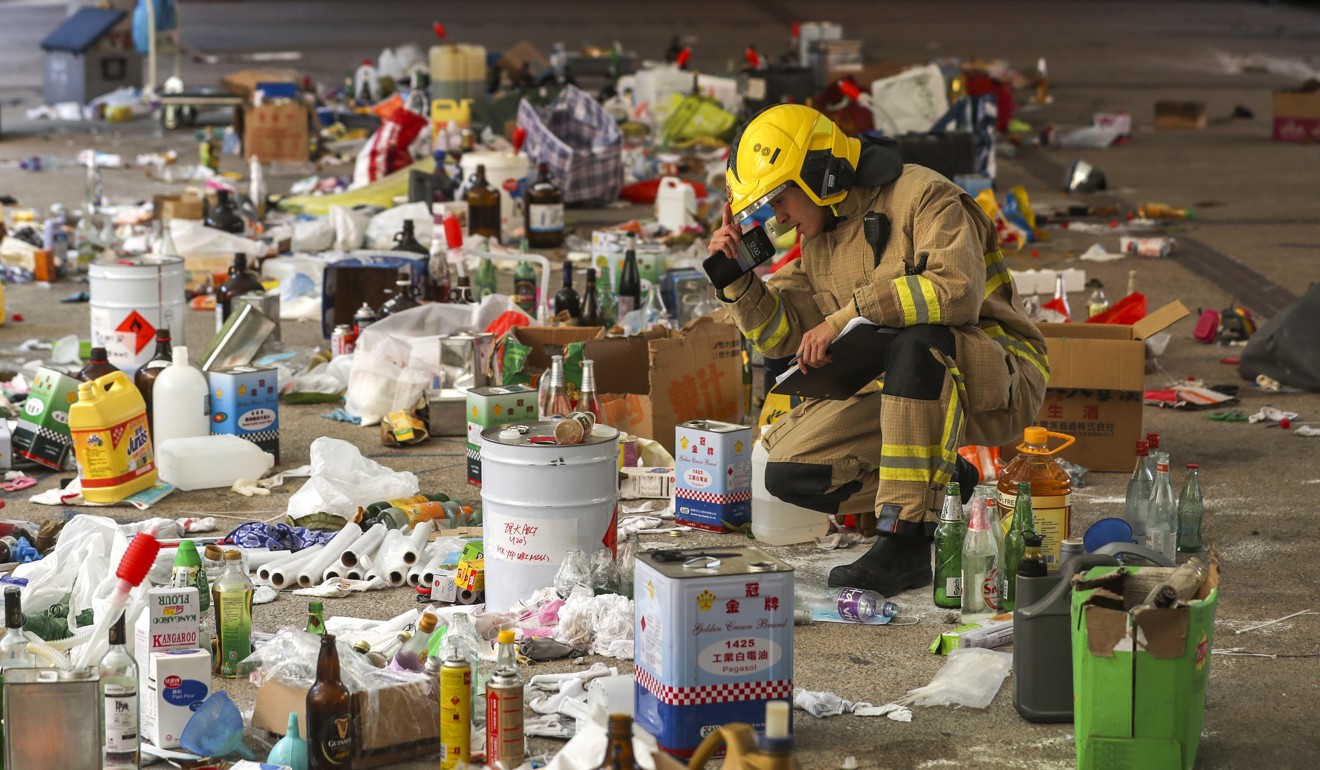
Hong Kong Polytechnic University reopens to some staff and students, weeks after its descent into protest war zone
- Academics and postgraduate students return after campus was devastated by clashes last month
- Violent exchanges of tear gas and petrol bombs last month led to police siege of radical protesters
Staff and doctoral students on Wednesday returned to a Hong Kong university ravaged by protest violence and besieged by police for nearly a fortnight last month, as its Hung Hom campus partially reopened.
After presenting their staff cards or authorisation document, those who worked in cleared areas were let in to Polytechnic University by recently hired security guards at three entrances.
Many were eager to find out how the drama had affected their workplace. Some who were still worried about their safety wore surgical masks, multiple rounds of tear gas having been fired on the campus as radical protesters and police clashed during the mayhem. Occupiers were also accused of removing hazardous chemicals from labs.
Campus cafe and restaurant operators joined those heading back, aiming to assess the damage after losing access to the site more than three weeks ago.
On Tuesday, PolyU management sent an email to staff and research postgraduate students, saying they would be allowed to return to two buildings once they had signed a document showing they understood the risks.
The force declared the unrest a riot before surrounding the site for 13 days, initially with hundreds of hard-core demonstrators trapped inside.
In Tuesday’s email to staff, the university’s facilities management office said: “We understand that some staff and RPg [research postgraduate] students are quite anxious to resume work in their offices and laboratories.
“Since we consider blocks Y and Z generally safe after our initial assessment, offices in these two blocks will be reopened on December 11.”
Before being granted access to the buildings, those eligible had to sign a “letter of understanding” and acknowledge they had “evaluated the circumstances and taken precautionary measures”, the email read.
Up to 100 activists still holed up as Hong Kong campus stand-off continues
Other parts of the campus would reopen in stages in December and January as damage assessments, safety inspections and cleaning exercises had been “progressing satisfactorily”, it added.
Engineering department researcher Leo Kwan, 38, said the saga did not affect his work as it could be done online, though it had hindered his teaching.
“I kind of have an idea from reading the news. I am going in to see how the facilities and computers are faring,” Kwan said, before heading to block Y.
A 28-year-old mainland Chinese doctoral student, surnamed Liu, said he had not been able to return to block Y, where he was conducting a project on organic chemistry. He expected his research had been affected by the events of recent weeks, although he was not sure to what extent.
“I have to find out if things have been damaged first,” he said.

A cafe supervisor, surnamed Chow, 43, went to inspect the W Kiosk in block W to see if any repairs were needed. But he expected damage to be limited as the kiosk was tucked away in a hidden spot.
An employee surnamed Cheung, who was involved in the clean-up, said the work was almost done.
The university said earlier that PolyU’s second term would begin as scheduled on January 13, although the first two weeks would be for holding exams that were supposed to have been taken in the first semester. Teaching will begin from February 3 onwards. A partial reopening of the library, which was flooded during the siege, is also tentatively set for January 13.
PolyU chairman bemoans immeasurable loss to research projects
Police withdrew from the campus on November 29 after searching for evidence and removing hazardous items.
About 4,000 petrol bombs were found along with nearly 600 items classified as weapons.
The university also said in the email that environmental samples from the campus were still being collected for further analysis for dioxins, cyanide and water quality. It said some samples had already been sent for testing.
Results were expected to be released in the second half of December.
Research assistant Eddie Lee, 23, from the health technology and informatics department, said the university should not have reopened until all the tests were run.
“Many rounds of tear gas were fired and there could still be traces of them,” he said.

Meanwhile, in response to a question at the Legislative Council concerning stolen dangerous chemicals, Secretary for Education Kevin Yeung Yun-hung said the universities concerned should reflect on how to improve campus management.
“If the chemicals in the laboratories fall within the definition of dangerous goods, the universities … [should] ensure that the storage and use of dangerous goods on campus meet the requirements of the relevant ordinance,” he said, adding that the Education Bureau would help universities to boost security.
Additional reporting by Natalie Wong and Alvin Lum


